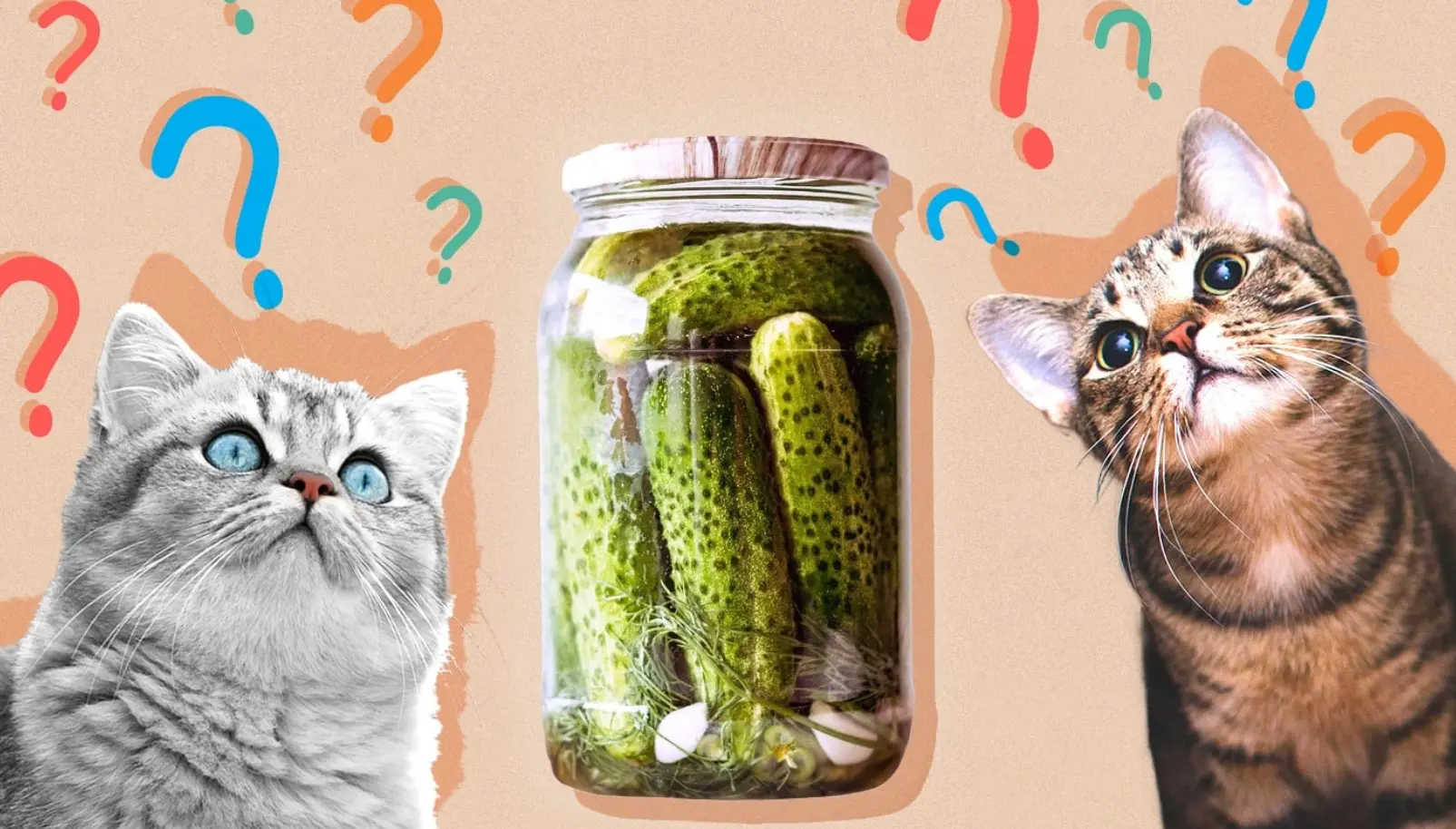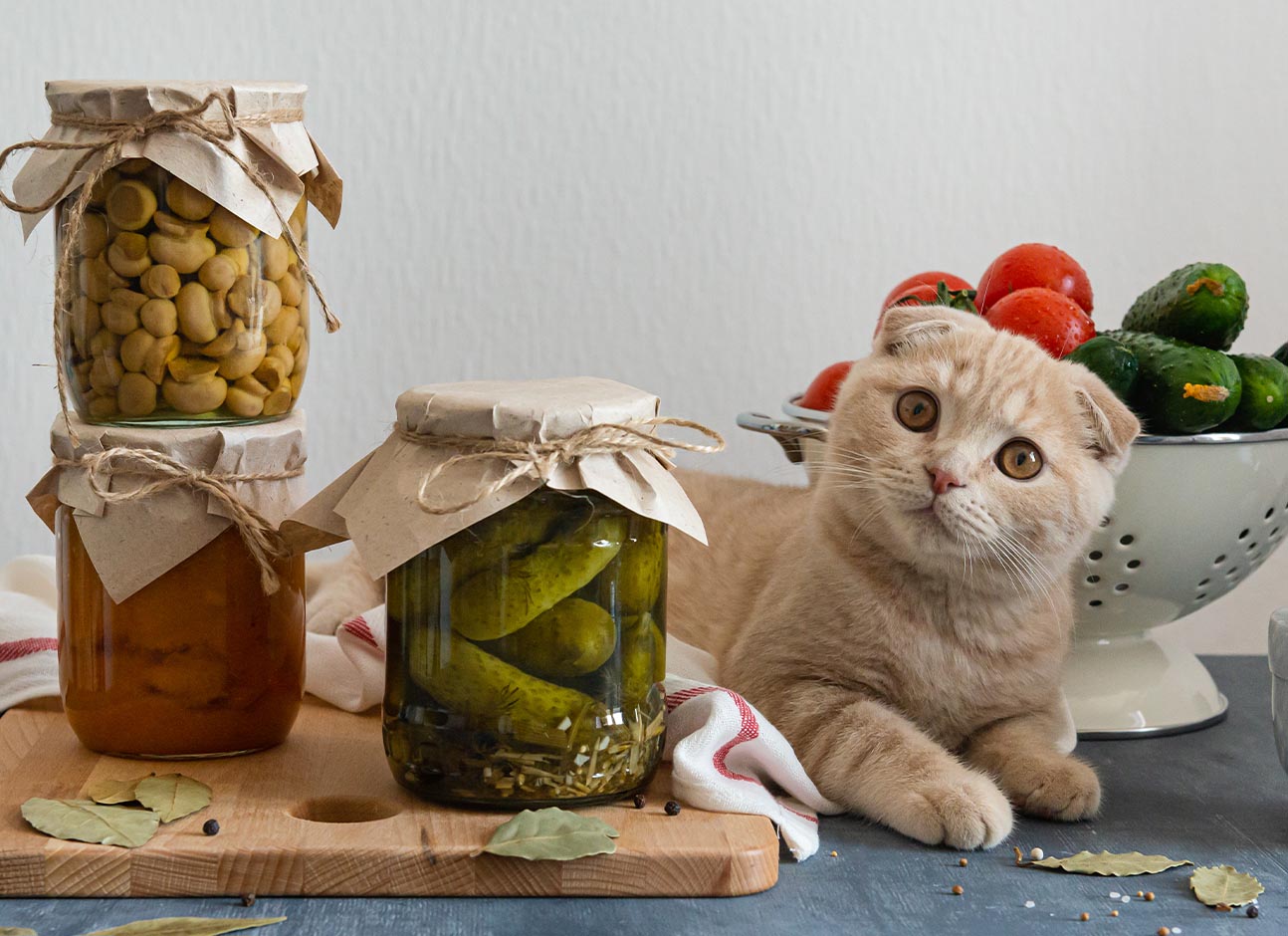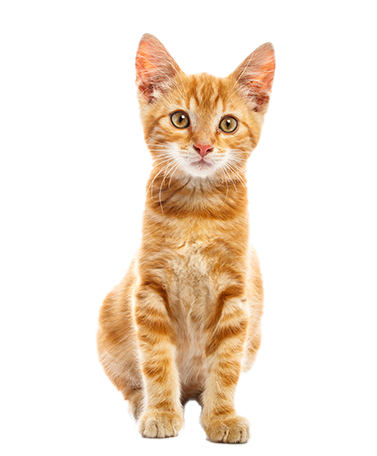Reviewed by Dr. Luciano de Gatica
Updated on 07/22/2024
Reading time 5 min.
Overview
Severity: Low
Life stage: All
Cats and pickles go together like peanut butter and jelly. But can your cat eat pickles? That depends on what you mean by “pickles” — whether it’s a pickled cucumber or jarred dill relish. In this article, we’ll look at some of the most common pickles found in stores today so that you can decide whether your feline friend should be enjoying one of these tasty treats.

Cats and pickles
Can cats eat pickles?
Pickles are a tasty treat for humans, but not for your cat. The excessive amounts of salt in pickles can harm cats, who tend to have a high thirst drive and need water more than other animals. Additionally, the pickle juice will make your feline’s breath smell like something from your fridge!
If you want to give your cat something special that they won’t throw up on (or come back at you with), try putting some candied red peppers I mentioned earlier in his food bowl instead.
Adverse Effects on Health of Excessive Sodium in Blood
Excess sodium can lead to high blood pressure, which can cause heart disease and stroke. High blood pressure also increases the risk of kidney disease.
Cats are susceptible to salt due to their inability to regulate their salt levels. In addition, cats have a higher affinity for table salt than humans (about one-third) – says Dr. Luciano de Gatica
So if you have a cat that is continuously eating pickles or other salty foods, then it’s essential for them to not only become accustomed to these ingredients but also develop an aversion towards them so as not to overdo any situation where you might give them any canned goods containing high amounts of sodium content such as pickles or olives.
Seek Vet Help if Symptoms Occur
You must seek veterinary care if your cat starts to show excessive garlic intake or garlic poisoning. Symptoms of garlic toxicity can include vomiting and diarrhea, weakness or collapse, seizures, and death.
Other pickle ingredients can be harmful to cats as well. Vinegar is a common ingredient in pickles that contains acetic acid and has been shown to cause organ damage in animals when consumed over time (although it doesn’t usually affect humans).
| Symptoms | Frequency |
|---|---|
| Vomiting | Common |
| Diarrhea | Common |
| Weakness | Common |
| Collapse | Less common |
| Seizures | Less common |
| Organs damage | Less common |
| Death | Less common |
Other Pickle Ingredients Harmful for Cat Health
Other pickle ingredients are also harmful to cat health. Salt and vinegar, two common ingredients in most pickles, can cause severe damage to your pet’s kidneys and liver. Dill leaves contain an alkaloid called dillapioquinone, which can cause diarrhea in cats and dogs. Onions are notorious for causing Heinz body anemia in dogs (a condition where red blood cells break down), so if you feed your kitty a lot of onions on top of being a pickle addict (which I think is pretty good), then you might want to rethink keeping them around! Cucumbers are another ingredient known to cause Heinz body anemia in dogs—though it may not taste as bad as the other two mentioned above!
Symptoms of Excessive Garlic Intake and Garlic Poisoning in Cats
If your cat is overeating garlic, it’s likely to experience some of the following symptoms:
- Vomiting
- Diarrhea
- Bloody stool (may also be present)
- Drooling
These symptoms can occur in both cats and dogs. In addition to vomiting and diarrhea, cats may also experience low blood pressure and seizures or coma.
| Symptoms | Frequency |
|---|---|
| Vomiting | Common |
| Diarrhea | Common |
| Drooling | Common |
| Bloody stool | Less common |
| Low blood pressure | Less common |
| Seizures | Less common |
| Coma | Less common |
Conclusion
It’s essential to learn the signs of a pickle overdose and the effects that might occur if your cat consumes too much of it. Gastrointestinal symptoms such as vomiting or diarrhea may be present in cats who have been fed pickles and should be treated immediately with antacids like Maalox or Pepto-Bismol.
If these symptoms persist for more than 24 hours, call your veterinarian for advice about further treatment options.

Share this, choose your platform!
Writen by
Dr. Luciano de Gatica
DVM
Luciano de Gatica graduated in 2005, as a Doctor of Veterinary Medicine, from Universidad Nacional de La Plata (UNLP) in Argentina. He gained extensive experience in the field of…

